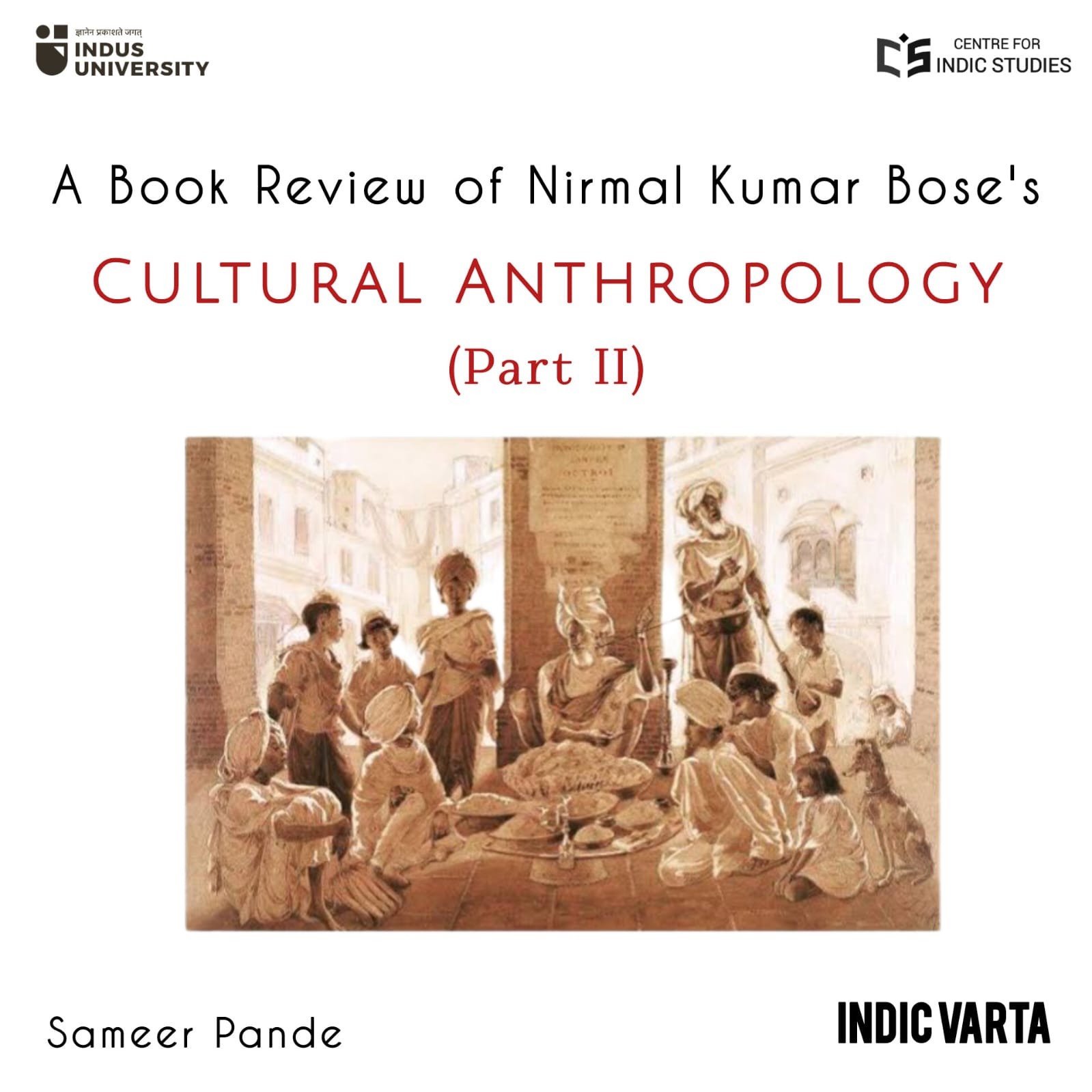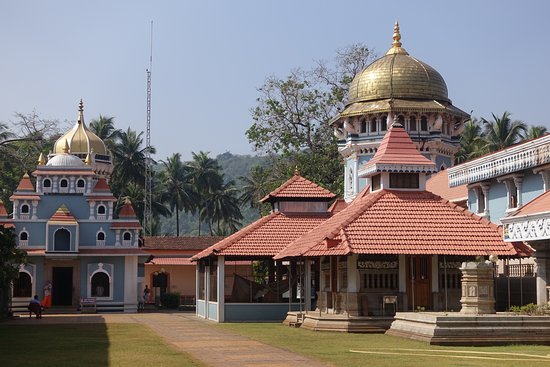- Visitor:32
- Published on:
From elemental to endless
“If he is there, then he might protect you, and if not, mark my word, I will chop your head with my sword”. Then he rushes towards the pillar and strikes it hard with full force. At a glance, a voice of thunder came roaring out of the post. The next scene provided goosebumps, as out of the blue, shattering down the strong construction, emerged a fierce form, making the blood run cold- a human shape with the head and limbs of a lion.
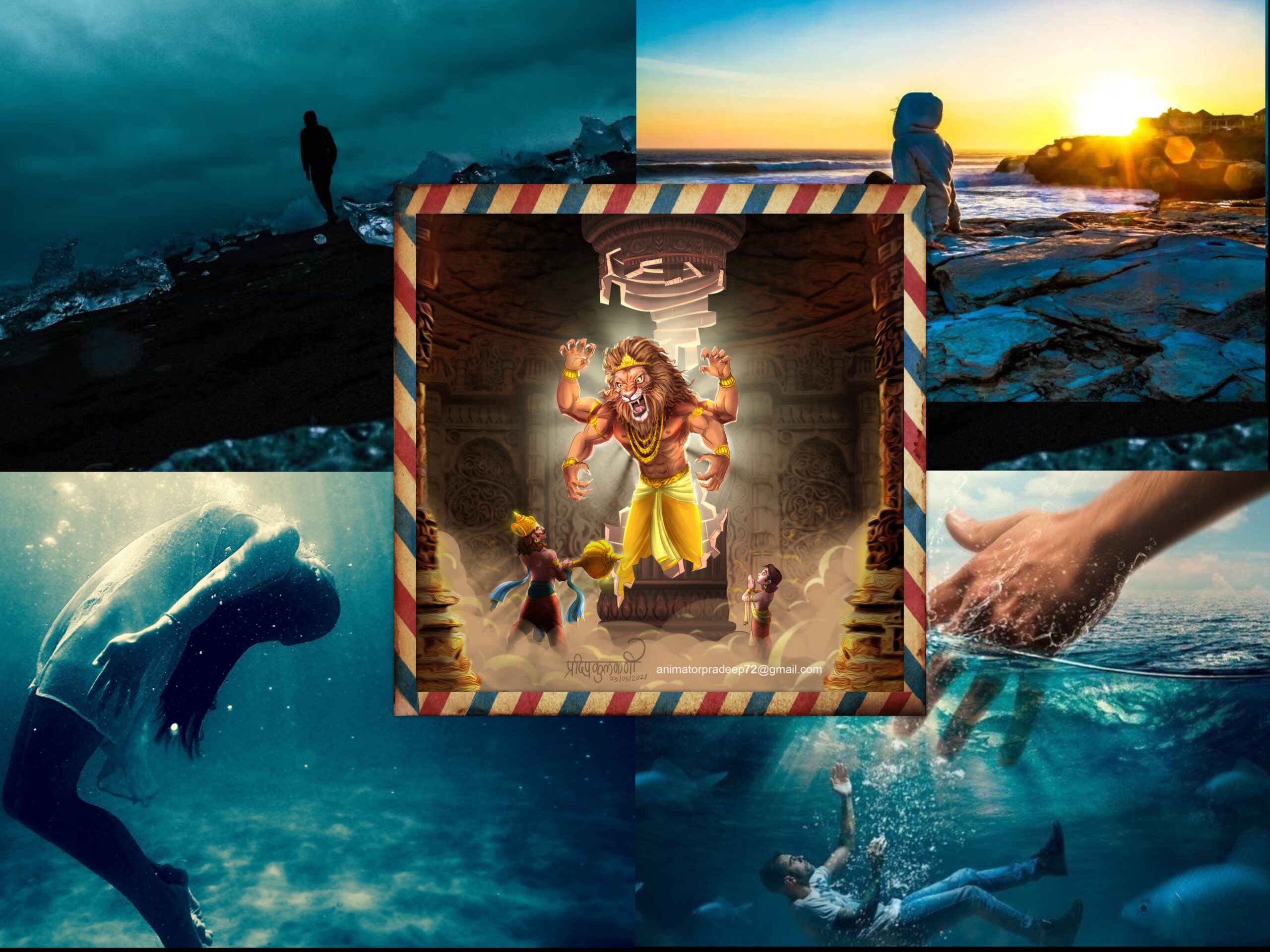

The key thinking of the Upanishads is to find the unity behind the diversity and changing dynamics of life. It is like pointing out the constant on the right hand side of a linear equation, that is a result of two variables. These are, firstly, the staticity among all the objects and secondly, the oneness behind every element of the universe. This has always remained the core of every subject cultivated in India. Moreover, this has been the consideration and aim of every life experience for the Indians. Initially, this oneness and staticity cannot be connected with our brain. We naturally live in the axiom that there is nothing that can be claimed to be fixed and perfectly designed and everything is changing and re-constructing itself. Nevertheless, through intense research or sadhana, one thing was figured out by the Hindus that the overall aggregation of these living and non-living elements itself is static and made up of the same element. For them, if this has not been true, then there is no certainty of existence. The ultimate shelter still lying in the deep web of nature’s network is ‘One’. Also, death is not the ultimate event here. It is an indication of further change, as always claimed by this ancient race.

Once, there was a king of Asuras named Hiranyakashipu whose name meant “the one who has a golden bed (hiranya=gold, kashipu=bed)”. The Asuras were born of the same parentage as the Suras. The Devas or Suras lived in heaven, from where they were frequently banished by the Asuras through muscle power. Vishnu was the sustainer of the world watching everything from the top. Whenever the Devas were in trouble, they used to complain to Vishnu, and He used to hear their appeal and drive away the Asuras from heaven. Once again, the Devas used to live in heaven peacefully and happily. One day, Hiranyakashipu expelled all the Asuras, assumed the title of Indra and declared himself the lord of the three worlds- Swarga, Martya and Patala!
Hiranyakashipu was a ruler who rolled in absolute wealth. This gave rise to ego and arrogance in him. Driven by these negative qualities he demanded absolute submission and recognition as the supreme power from everyone.
“I am greater than Vishnu!!!”
– this was the new slogan. He ordered all to accept him by beating the drum about himself, “I will not allow the worship of Vishnu and he is not the Lord. Now, look at me! Here is your ultimate ruler of the world!!”.
He had a little son named Prahlada from his wife Kayadhu. Prahlada means, “one who naturally evokes a feeling of happiness and peace (ahlada=cheerfulness)”. Fortunately, he was never like his dad. He was an ardent devotee of Vishnu and Vishnu was his adorable master. From his very childhood, he used to say:
“Vishnu is my best friend and I love Vishnu!”.

As Hiranyakashipu came to know about the facts about his son getting out of hand, he sent him to a couple of Asura teachers. They used to assure that nowhere in the textbooks is any knowledge mentioned about Vishnu. One day they noticed, Prahlada is busy teaching his classmates about Vishnu under their noses. Although repeated prohibition Prahlada did not listen to them and rejected to turn away from Vishnu. As a result, the teachers complained to Hiranyakashipu. After long contention, the boy also did not listen to his father.
When asked about all his studies to date, the boy replied, “I have only learnt to say… Vishnu… Vishnu.”
With two big scrowling eyes full of fury Hiranyakashipu turned towards the teachers.
“Its not us”, the masters nodded their heads in a trembling voice, “He is saying this of his own accord”.
“So…once again…What is the name of the rascal you just uttered? Who is this guy?,” asked Hiranyakashipu.
“Vishnu. The Lord of my heart!” smiled Prahlada.
“Lord of your heart? Ha.. ha… How can you have any other Lord when I am standing in front of you?”
“Vishnu is not only my Lord, he rules you as well,” replied Prahlada. “The ruler of every one of us”
Then, getting irked, Hiranyakashipu ordered his guards to kill Prahlada. However, the spears of the guards seemed to be of no power to pinch Prahlada’s skin. Hiranyakashipu got enraged. He shouted and charged his men to throw his son in front of a mad elephant. Nevertheless, this time the elephant could not smash Prahlada and their tusks broke on his breast. It was like his body has turned into iron.

Further, many attempts were taken like throwing Prahlada from the top of a mountain, injecting poison forcefully, putting him into the fire, throwing him in a deep well, and deviating his mind by hypnotizing through magicians. In all the attempts they were unable to perform any minimum harm to Prahlada. In every situation Prahlada was out of the woods counting on and chanting, “Vishnu is within me and so nothing can harm me”.
One day, Hiranyakashipu’s sister, Holika was summoned. By preparing a bonfire Hiranyakashipu asked Holika to sit with his son Prahlada in her lap wearing a magic cloak that prevents the owner from fire. As the fire grew, a strong breeze started swaying the cloak. Prahlada started chanting Vishnu’s name. The cloak flew from the lady’s body and sheltered Prahlada from the flames.

“These are not my powers,” shouted the proud little devotee with joy. “These belong to Vishnu.”
Standing at the end of his rope, with a last hope, Hiranyakashipu ordered his men to tie up his son with the huge snakes from patalaloka (place under the earth’s surface/under-world/world of crime and sin). “Now his time has come”, boomed Hiranyakashipu, “Throw the black sheep of the family into the sea, and impose the big rock on him. This time the cards are stacked against him. If he does not die soon, in due time he will surely give up his breath. This is definite”.

As Prahlada was been embroiled with the fierce serpents and cast into the sea, he was only reminding Vishnu with one focus. “Vishnu…Vishnu!” He whispered- “Oh Lord of the Three worlds- all loving Vishnu, I welcome you!” Constantly envisioning Vishnu and praying to him, Prahlada realized that Vishnu was near and already with him.
While drowning with the pressure of the rock in the waters and sinking more and more, in the hell of a time he realized that “Ah!! Vishnu is always with me. Then, why must I get frightened? Whatever might happen to me, I know Vishnu is always with me. O Lord of the universe, I bow down to you!”.

The guy gradually realized that Vishnu is not only near him but also inside his body. Next, he realized that Vishnu has united with him, and he himself is Vishnu. “I am not different than Vishnu. I and Vishnu are the same. I am the Vishnu”, Prahlada mumbled in mind, “I am everywhere, in every place and inside every element”. As soon as Prahlada concluded this, all nooses of snakes loosened. Eventually, the entire knot fell off. Suddenly, the burden over his head broke into pieces and float away into the sea. Then, the sea gently dragged Prahlada towards the shore, placing him at the tip of the wave.

Standing there, at a glance Prahlada forgot that he is a prince. He forgot that he is a human. He forgot that he is Prahlada. He started to think that is the all-mighty. He started to understand that he is the origin of the universe. Nothing has the force to wound or hurt him. He is the ruler of the universe. One after the other, various astonishing and never-known-before thoughts came into his mind, that made him spend many hours living by those ideas, standing at that place. Then, gradually his rising thoughts started to diminish, winding up with the old conclusion that he is a child and he has a body and his name is Prahlada. But, till then he had transformed into a new Prahlada as he realized that Vishnu is within him and surrounding him. Everything ended up as the “Vishnu”…

(translation)“I know only you exist, therefore I live,
You are the soulful, therefore I live,
The more I get to know you, the more I want, the more I know, the more I don’t know.
I know that I will find you constantly, in every person, from person to person, constantly, in every world, in every era
There is no one between you and me, there is no barrier in this world.”
The Hindu ideas, during the early ages, used to derive conclusions through lots of complementarities, that could be with blind searches and errors. The visible world was realized with its ultimate staticity and balance after lot of changes in understandings about mind. This was searched by the Indians in the oneness of nature within own self . Now the question was, whether the power or existence could be grasped through intelligence or not. Whether it was God or it was just Nature itself? With full doubt, the Rigveda declared- “he verily knows it, or perhaps he knows not”. Nevertheless, they winded up that the constant behind all the motions of the world or life, as a simplification-is the ever-existing factor that has its reflection and indication on the visible elements around us. Since it was beyond the world and neutral in nature- hence it is Nitya or eternal, neither changing nor can be further divided and is beyond any deviation. In the next step, they saw that the aim they were trying to reach through pure logic and arguments- is the same factor called ‘oneness’. Through Yoga or thorough concentration, it was the first realization- Nityahanityanam or the ‘one’ behind different motions. Again, they also came to the conclusion that the consciousness of that oneness is the same consciousness within every living being. Here, another such contribution to the anthropic principle by the ancient Hindus was in the term- Chetanaschetananam– or the one uninterrupted consciousness lasting beyond every consciousness of this intelligent design!

Now comes, the third important perception of the Rishis or the seers i.e. “the one who knows himself knows the whole world.” This is because the self factor or I-ness is totally indistinguishably the same as that of the wholeness. Thus, the one who is claimed to be beyond knowledge now comes in our hold. These truths are stored with care in the two terms of Vedanta.
Sohham– He is me
Aham Brahmasmi– I am the Brahman, eternal.
…Prahlada has not died. The news was not late to reach the ears of Hiranyakashipu. He was found to be standing alive in the seashore like a shag on a rock. “What shall I do now????”, the helpless king made a dry face after all his attempts failed to move the heaven and earth. At his wit’s end, he summoned Prahlada near him. Controlling his anger in heart, for the last time, in his court, he tried to convince politely by telling, “Listen, my dear son, I am the king of Asuras and you are my son. One day you will grow up and become the king of the demons, right? For now, don’t jump your ship and learn how to become a king. I have already told you that I am greater than Vishnu. So you will follow me, not that Vishnu!!!”.
“You are not superior to Vishnu”, answered Prahlada. “Wake up, there is no one greater than him”.
“You what? You are still silly”, said the father, “You have not reached the suitable age to understand all these. Think a wee bit, you are just crying for the moon as a stupid child”.
Prahlada calmly added insult to injury, “Cool it father, I know I am not demanding the moon. I know Vishnu loves me, he is there everywhere and till the date he wishes, you will remain as the king. You come out of the fool’s paradise!!”.
Hiranyakashipu bursts out. After many arguments, explanations and taking suitable measures, as Prahlada was at his daggers drawn, being firm in his thought, Hiranyakashipu shouted at the innocent.
“Listen, now you are the archenemy to me. No love lost between! What did you say? Vishnu is everywhere right???”, said the king. Then pointing to a pillar in his court he further said, “Look at that pillar! If he is everywhere, then he might be within that pillar, no??? I’m dying. What a fool you are!!!!”
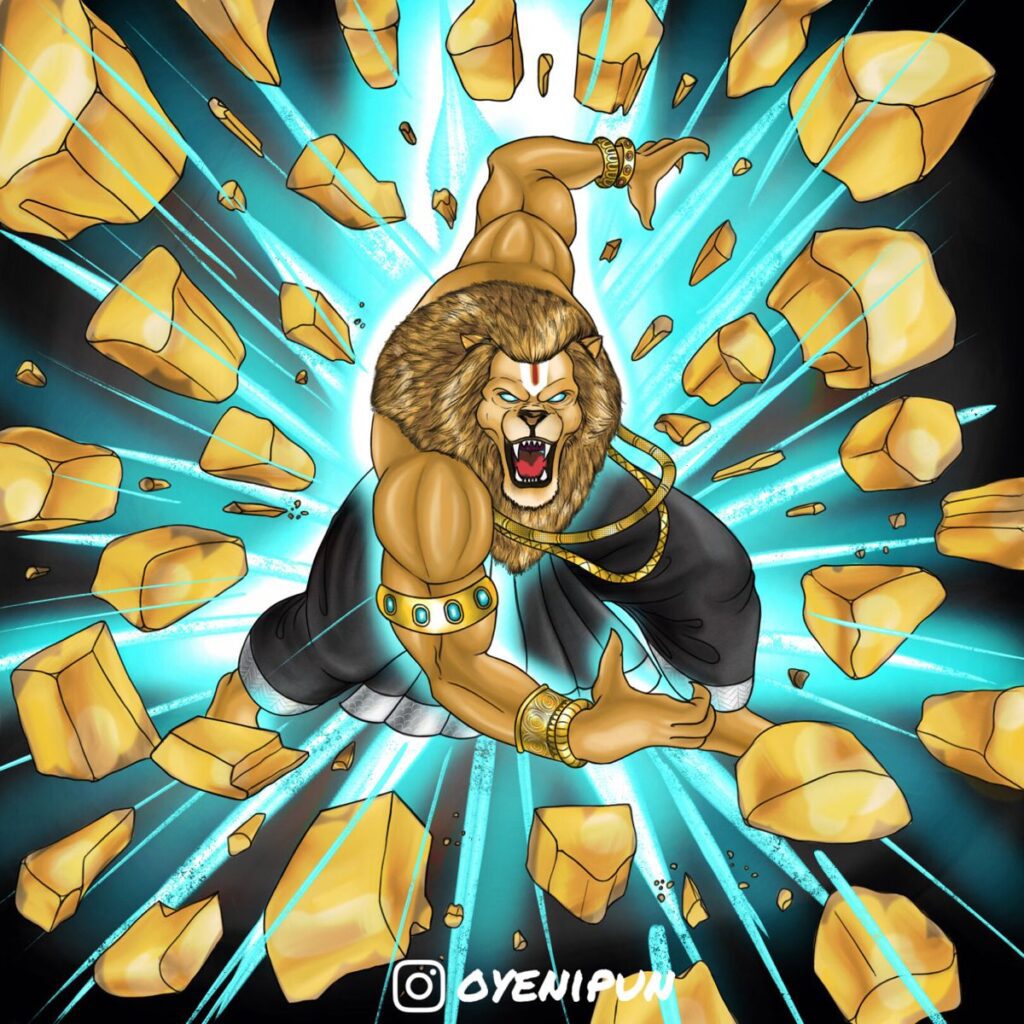
“If he is there, then he might protect you, and if not, mark my word, I will chop your head with my sword”. Then he rushes towards the pillar and strikes it hard with full force. At a glance, a voice of thunder came roaring out of the post. The next scene provided goosebumps, as out of the blue, shattering down the strong construction, emerged a fierce form, making the blood run cold- a human shape with the head and limbs of a lion. The challenge of cruel outcry coming out from his mouth was enough to give a heart attack. It was Narasimha or half-animal and half-human incarnation of Vishnu, ready to make an attack on the Ausra kingdom unthought-of! He had a matted mane on his head with large mustaches and terrible teeth. His trembling paws had terrible nails ready to brutally scratch whoever falls on his way.

All the men standing behind the king became terrorized and made a quick exit in fear. In a flash, a strong fight took place between the king and the new protector of Devas. At last, Narasimhadeva pulled the body of the demon ruler on his lap, and like a savage tore apart the chest, gutting across through his claws, till the king could breathe his last.
Meanwhile, all the Devas came out and started praising Vishnu. Prahlada also came forward and surrendered at his Lord’s feet. This made Narasimha gradually diminish his anger.

Standing in front of his master, Prahlada was delighted and thrilled at the same time. With full emotions he spoke, “I have seen your face, I have nothing more to wish. I don’t want any blessing, neither materialistic nor spiritual”.
“Then wish anything else”, Vishnu said.

“As you please. Then promise me that I can always love you. Ensure that as long as you are there, there should not be any lack of devotion for you”, the devotee solicited.
God was blown away by the response. He declared,
“Can say that again… This is true- that those who love me never want anything else more. Hence, I am declaring, from now till death, my blessings will look after you, Oh the apple of my eye! Resting assured on me, continue doing your Dharma. After your death, you will reach me”.
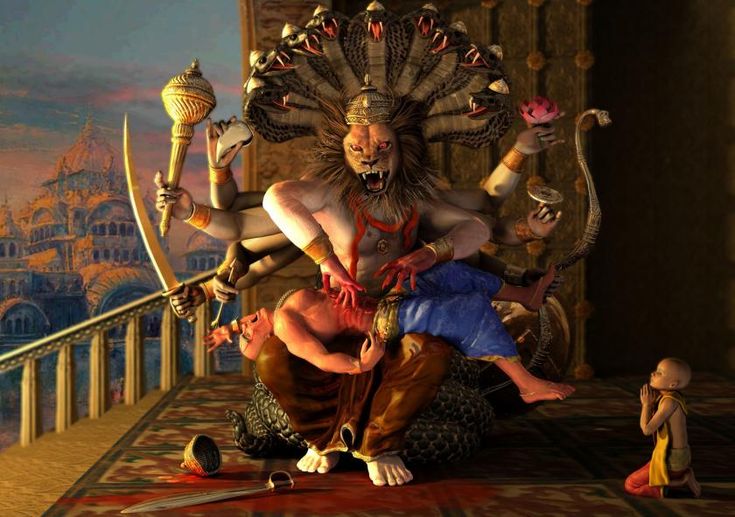
Some experts opine that there is a mild indication of the transition of the region of the Indian subcontinent from Chalcolithic to Iron Age in the story- in the mentioning of the claws of the sustainer who came down to earth, to be the time of using iron weapons. The half man- half lion idea and killing the ruler by those hands symbolizes the arousal of anger and uprising in the common man of the era, which eventually gave rise to a collective power for going against the corrupt and tyrannical power mongers. Again, other scholars have also claimed that the above narration denotes the application of higher intellect to assassinate with cunningness (instead of muscle power that was used by Vishnu, in taking the life of Hiranayksha, the elder brother of Hiranyakashipu) by the Indians to throw away the brutal outdated political oppressors of that time and establish peace and further prosperity- like pay Hiranyakashipu for his deeds in neither during day nor night, neither outside the home nor inside, neither through weapons that are dry nor wet, neither in the land nor sky and neither by human or animal.

Mohima tabo udbhasito mahagagonomaajhe,
Bishwojagoto monibhushano bestito charone.”
(song by Rabindranath Tagore)
In this world of bliss, as the light of blessing, Thou dost reign, O Glory and Truth.
Thy majestic splendour
Sets alight the firmament,
All the sparkling jewel worlds
Lie circled at Thy feet.
– Translated by Chinmoyee Ghosh”
Rabindranath Tagore mentioned that the art of language, ending up with the truth in front of its readers- is at many times also unknown by its creator. For this, the poet points to the character of Prahlada. Tagore further writes that the people and community who have shaped the character of Prahlada indicate the fact that they themselves had never surrendered their self-thinking and independence of soul to oppression. Those kinds of outrages are happening every day, everywhere and at many times with us. Nonetheless, they have not accepted cruelty as the ultimate truth for human beings. What must be true for an advanced human personality and civilization was the ultimate truth for them and not that was happening always or every time. At the time when this literature was composed, the value of heroic perseverance have reached what extent can be easily identified from the story! (Banglavashaparichay, Rabindranath Tagore)
The events definitely make no sense if measured from a scientific and rational point of view. These are based totally on emotion and devotion of mind shaping the ultimate morals. Nevertheless, the aforementioned four terms at the back end in constructing the ideals of these stories have helped the Indian mind and philosophies to progress further- reflecting the thoughts in every aspect of the Hindu way of life- from spiritual to societal, political, literary, and cultural till revolutionary level at every age!

Content courtesies:
1. Upanishadabali (Bengali): By Sri Aurobindo
2. Stories for Children: Swami Vivekananda, Retold by Irene R. Ray
3. Banglavashaparichay (Bengali): by Rabindranath Tagore
4. http://www.geetabitan.com/lyrics/rs-a2/aanandaloke-mangolaloke-english-translation.html
5. The Saffron Chariot’s Facebook post
6. Bharat Gyan’s Facebook post
–Originally published at medium.com—
Center for Indic Studies is now on Telegram. For regular updates on Indic Varta, Indic Talks and Indic Courses at CIS, please subscribe to our telegram channel !
- 16 min read
- 0
- 0







